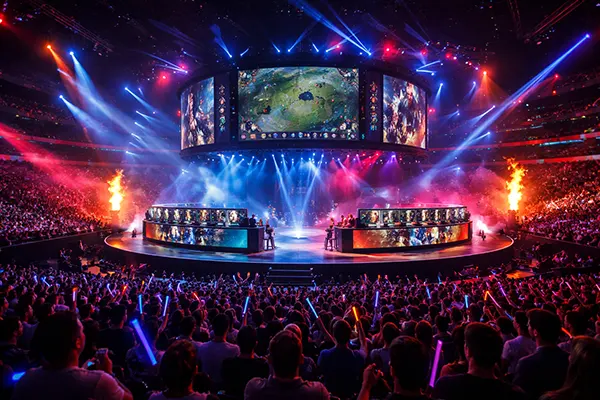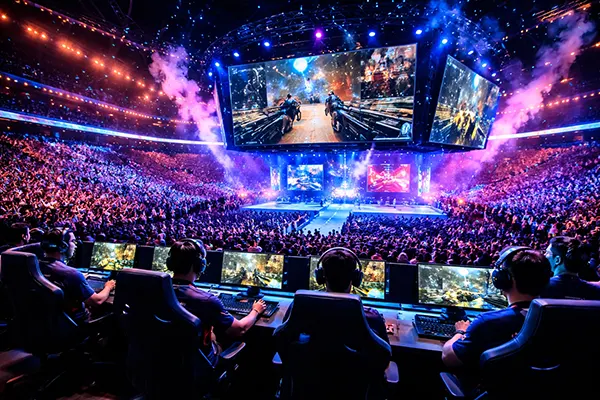Esports as a Key Revenue Driver: The Reflection in Betting

Over the past decade, esports has evolved from a niche hobby into a global entertainment industry attracting millions of fans and generating significant revenue streams. Alongside sponsorship deals, media rights, and merchandising, betting on esports has emerged as one of the most influential contributors to its financial growth. By 2025, the intersection of competitive gaming and betting has reshaped not only the way audiences engage with tournaments but also the overall perception of esports as a legitimate and profitable sector.
The Growth of Esports and Its Financial Impact
Esports tournaments now rival traditional sporting events in terms of viewership. Major competitions in games such as League of Legends, Counter-Strike 2, and Dota 2 attract audiences in the tens of millions worldwide. This surge has driven increased sponsorships and advertising, yet betting has become one of the largest areas of monetisation. Industry analysts estimate that the global esports betting market will surpass $25 billion in handle by 2025, showing continuous year-on-year growth.
Operators in regulated markets across Europe, North America, and Asia have incorporated esports betting into their offerings, allowing fans to place wagers on outcomes such as match winners, map results, or in-game statistics. This has introduced new revenue flows while broadening the audience base beyond core gamers to include traditional bettors seeking fresh opportunities.
The increasing legitimacy of esports betting is also supported by the integration of responsible gaming measures, licensing requirements, and data partnerships. These factors ensure the sector operates with transparency and reliability, further encouraging investment and consumer confidence.
Market Dynamics and Regional Trends
Europe remains one of the strongest markets for esports betting due to established gambling regulations and a culture of sports wagering. Countries such as Denmark, Germany, and the UK have experienced rapid adoption of esports markets among licensed operators. Asia, meanwhile, continues to dominate esports viewership, with South Korea and China driving massive audience engagement that fuels both domestic and international betting interest.
North America has seen notable progress since the legalisation of sports betting in multiple states, with esports gradually gaining recognition as a parallel market. Latin America and Africa are also showing potential growth, supported by increasing internet penetration and mobile-first betting platforms.
While each region has its specific dynamics, the global trend is clear: betting has become an inseparable element of the esports economy, enhancing its overall revenue model and positioning esports closer to traditional sports in terms of monetisation strategies.
Esports Betting as a Consumer Engagement Tool
Betting is not only a revenue stream but also a means of engagement. Fans who place bets are more likely to follow matches closely, increasing viewership hours and boosting the value of media rights. This additional layer of involvement has transformed passive spectators into active participants, making esports events more immersive and commercially valuable.
The availability of live betting options has expanded fan interaction, with in-play wagers on specific game events driving real-time excitement. Features such as cash-out, dynamic odds, and micro-markets allow fans to personalise their betting experience, aligning closely with the fast-paced nature of competitive gaming.
For organisers and teams, this engagement translates into stronger brand loyalty, higher audience retention, and improved sponsorship opportunities. Betting, when regulated and transparent, serves as a bridge between entertainment and financial participation in the esports ecosystem.
Responsible Betting and Regulatory Standards
As esports betting grows, regulators worldwide are focusing on ensuring integrity and responsible gambling practices. Match-fixing remains a risk, but initiatives led by organisations such as the Esports Integrity Commission (ESIC) have introduced monitoring systems to detect irregular betting patterns and protect the integrity of competitions.
Licensed betting operators are also implementing tools to support safer betting, including deposit limits, self-exclusion options, and age-verification systems. These safeguards aim to maintain trust and prevent problem gambling, ensuring that esports betting remains sustainable in the long term.
By enforcing strict regulations and promoting responsible betting, the industry is working to protect its reputation while maximising its growth potential. These measures are crucial to balancing commercial success with social responsibility.

The Future of Esports and Betting
Looking ahead, esports betting is set to become even more innovative through the integration of artificial intelligence, blockchain technology, and enhanced data analytics. These tools will provide operators with more accurate odds, faster settlements, and greater transparency for consumers.
Furthermore, the rise of mobile-first betting is expected to shape the next phase of growth, especially in emerging markets. With younger demographics increasingly comfortable with digital financial tools, esports betting will remain a strong driver of both participation and profitability in the sector.
Collaborations between betting operators, tournament organisers, and technology providers will further solidify the role of betting as a pillar of the esports industry. By 2030, analysts predict that betting-related revenues could account for a significant portion of overall esports income, cementing its place in the global entertainment economy.
Integration with Traditional Sports Models
One of the most notable developments is the growing convergence between esports and traditional sports betting. Established bookmakers are expanding their esports offerings, while some professional sports teams are investing directly in esports organisations, recognising the value of shared audiences and revenue models.
This convergence is shaping esports into a mainstream product, where betting is not an add-on but an integral part of the ecosystem. With dedicated tournaments, betting sponsorships, and integrated fan experiences, esports is increasingly following the blueprint of football, basketball, and other traditional sports.
Ultimately, the future of esports betting lies in striking a balance between innovation, regulation, and consumer trust. If these elements are maintained, esports will continue to thrive as a leading entertainment and betting industry worldwide.




